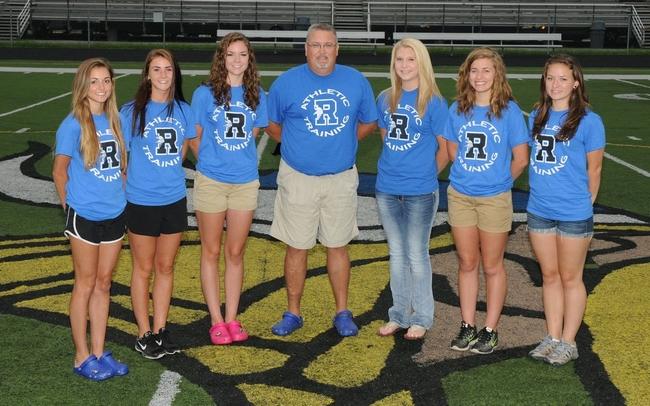
They’re there before anyone else. And they’re there long after everyone else is gone. The Ripley Athletic Training staff is an integral part of Viking athletics, and utilizes a group of dedicated students under the direction and guidance of 2015 MSAC and West Virginia Athletic Trainer’s Association Athletic Trainer of the Year Steve Lough. Lough and his six student trainers–seniors Myranda Murphy, Caylee Painter, Makenzie Hartley, Brooke Carter, Kelsey Holmes and Angel Knight–are tasked with making sure all the student athletes who wear the blue and white are properly prepared for both games and practices, as well as appropriate care when an injury inevitably arises. As you might expect, this task is fairly time consuming.
“These girls and guys I’ve had before get practice set up, get water set up, all the equipment out to the field,” Lough said, “That takes a little bit of time, and they do a really good job at that.”
While the position is time consuming, the training staff is undoubtedly properly trained and vetted. Lough, who also serves as a teacher and athletic director at Ripley High, is now in his sixth year of utilizing student trainers. He begins to assemble his staff when they are juniors in his Athletic Training I course. From there, all those interested in furthering their service must go through an application process, including a resume evaluation and interview, and are then chosen by Lough and other members of the medical staff. Once selected, they get to work on preparing and executing the various tasks related to the training program.
Murphy, Painter, and Hartley were all interested in pursuing careers in the medical field once their time at Ripley High School is up, so becoming student trainers was an obvious choice.
One of the more interesting aspects of the program is the closeness it fosters. In talking to Murphy, Painter, and Hartley during a recent football practice, they each noted that being apart of the training program has been a fulfilling experience, as it has allowed them to get to know each other more, as well as get to know many of the athletes (who are also friends) better.
“We have a lot of fun together,” Murphy said, “My favorite part is interacting and [the players] are our friends, but when they’re in their game mode, we have to let them be in their game mode. I’ve learned most of their personalites. I like watching [the players] and how they interact.”
For Painter, an up close and personal experience in seeing injuries and how to treat them is her favorite part of the position. However, as she would point out with a smile, that comes with some drawbacks.
“There’s so much different stuff in different bags and different hand signals,” Painter said, “To know where everything is kind of hard sometimes. Also, dealing with the boys on the sidelines when they smell awful. But, it’s a lot of fun and I’m glad I did it.”
Hartley echoed those sentiments.
“Learning new things and interacting with new people,” Hartley said, referring to her favorite part of the position, “It’s a lot of time, so that’s the most challenging part. If there’s an injury, you don’t quite know what your boundaries are sometimes. But, it’s something that I think I want to pursue in the future, so I thought it would be good experience to have.”
Staying on task and keeping the schedule is difficult for any program, but Lough noted that his staff does an excellent job. Aside from their duties as student trainers, this particular crew has many other extracurricular activities that they must tend to. However, Lough and his staff do a great job of delegating tasks and making sure each trainer knows their specific task to perform.
Lough praised his staff endlessly for their devotion and help, and when it comes right down to it, that help is extremely important to the functioning of the entire athletic program at Ripley High.
“For one person, it’s tough dealing with 55 players,” Lough said, “They’re the eyes and ears of what goes on on the sideline. They can give me a shout. They’re capable of knowing and giving me assistance. Of course, they can’t perform any type of evaluation or anything of that nature, but they can grab tape or things like that to help out. They’ve gone through what I call ‘proficiency’, and they have a check off sheet as to what they can do and where they’re comfortable.”
“These girls have put in almost 250 extra hours,” Lough concluded, “They take away a sense of pride and accomplishment of doing a great job. They put in a lot of extra hours. They’re here before and after [games]. Their dedication to the program will carry on for them later in life.”
ORIGINAL ARTICLE:
http://www.jacksonnewspapers.com/article/20151104/SPORTS/151109863/?Start=1